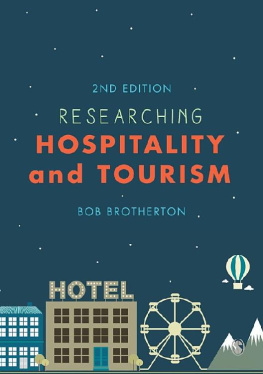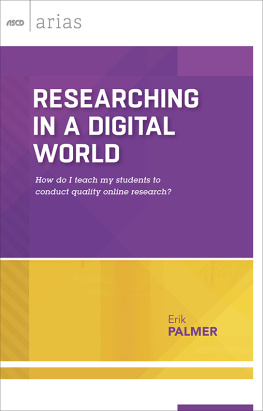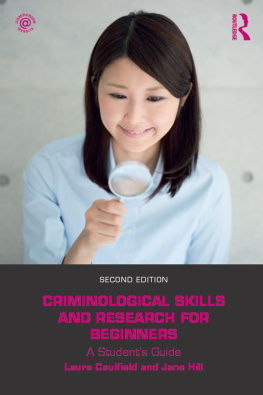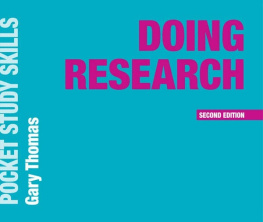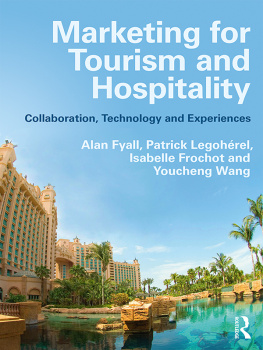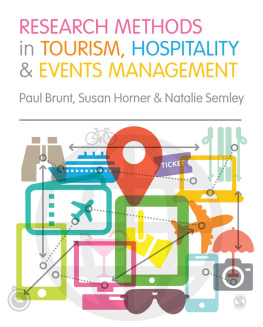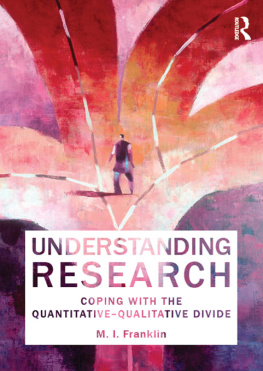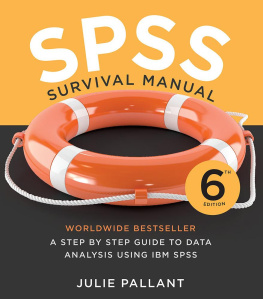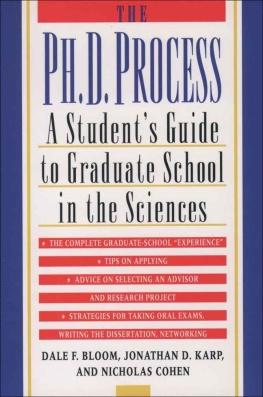Researching Hospitality and Tourism
For Penny my one and only love and soul mate
Researching Hospitality and Tourism
SAGE Publications Ltd
1 Olivers Yard
55 City Road
London EC1Y 1SP
SAGE Publications Inc.
2455 Teller Road
Thousand Oaks, California 91320
SAGE Publications India Pvt Ltd
B 1/I 1 Mohan Cooperative Industrial Area
Mathura Road
New Delhi 110 044
SAGE Publications Asia-Pacific Pte Ltd
3 Church Street
#10-04 Samsung Hub
Singapore 049483
Bob Brotherton 2015
First published 2015
Apart from any fair dealing for the purposes of research or private study, or criticism or review, as permitted under the Copyright, Designs and Patents Act, 1988, this publication may be reproduced, stored or transmitted in any form, or by any means, only with the prior permission in writing of the publishers, or in the case of reprographic reproduction, in accordance with the terms of licences issued by the Copyright Licensing Agency. Enquiries concerning reproduction outside those terms should be sent to the publishers.
Library of Congress Control Number: 2015939811
British Library Cataloguing in Publication data
A catalogue record for this book is available from the British Library
ISBN 978-1-4462-8754-5
ISBN 978-1-4462-8755-2 (pbk)
Editor: Chris Rojek
Assistant editors: Gemma Shields and Delayna Spencer
Production editor: Katherine Haw
Copyeditor: Elaine Leek
Proofreader: Christine Bitten
Marketing manager: Michael Ainsley
Cover design: Shaun Mercier
Typeset by: C&M Digitals (P) Ltd, Chennai, India
Printed and bound by CPI Group (UK) Ltd, Croydon, CR0 4YY
List of Figures and Tables
Figures
Tables
About the Author
Dr Bob Brothertonis currently a Visiting Professor in Hospitality Management at the NHTV University of Applied Sciences, Breda, The Netherlands. He was formerly a Reader in Hospitality Management in the UK and has been a visiting professor and/or external examiner at higher education institutions in a number of other countries, including Switzerland, Greece, Cyprus, India, Dubai, Turkey and Spain. He has more than 30 years experience of teaching hospitality management subjects, and around 25 years of teaching research methods to hospitality and tourism students, during which time he has also supervised a large number of student dissertations/theses, based on empirical research, at BSc, MSc and PhD levels. As an active researcher he has had numerous books, journal and conference papers published, many of which have been based on the results of empirical research he has conducted.
Preface
In coming to write the preface for this second edition of the text it remains clear to me that much of what I wrote for the preface of the first edition remains germane and so I offer no apologies for repeating this here. However, although this second edition does follow the same basic structure and philosophy of the first, it also embodies some significant differences, both in terms of revisions and updating to the original text and new additions to this second version, which I will describe later after the rationale for the original, and this, edition that follows.
This text has been designed specifically for undergraduate students undertaking degree programmes in hospitality and/or tourism, though postgraduate students on these types of programmes may also find this material useful. It has been written to assist students undertaking the type of research project frequently required in the final year of such programmes that is associated with the production of a dissertation or research project report. In terms of its structure and contents, essentially it takes you through the issues and decisions that need to be considered and made to conceive, plan, conduct and write up the type of research project you are likely to be required to complete for such a course, unit or module. In this sense it seeks to take you through each decision and action stage of the research process, from identifying a topic and formulating the research question or aim and objectives to writing up the final document.
In compiling this text I have been acutely aware, as a result of my long experience of teaching undergraduate hospitality and tourism students the type of research methods module frequently included within a programme, of the need to provide students with the methodological issues, tools and techniques necessary for conducting a research project, because students often find it a somewhat alien area compared to much of the other content within these types of programmes. On many occasions I have encountered the view from students that all this methodology stuff and research is not as important as other vocational and/or business management material, for which they can see more immediately the relevance and potential usefulness of studying. Often, research and its associated methodological considerations are seen by students as just a task that has to be done to fulfil the requirements of their degree course and that all this research stuff is just an academic exercise that really has no value in the real world after graduation because its what academics do while practitioners get on with the important business of managing companies.
Of course, this is true to a certain extent, but it is a fallacy to believe that the knowledge and skills developed in studying and undertaking research will not be of practical use in the real world. The intellectual development this engenders is invaluable in its own right but also, beyond this, the business world is rapidly becoming a more complex and dynamic environment within which conventional knowledge and accepted practices become outdated much more frequently. Indeed, in your future as a hospitality or tourism manager, it is reasonably certain that the fundamental basis of existing business models will be challenged and changed because of new ideas, concepts, products, processes and so on much more rapidly than has been the case in the past. In turn, the rationale for change is likely to be derived from research activity, be it conducted by academic, commercial or company researchers, that seeks to challenge the status quo and develop new knowledge and techniques. Similarly, you may well be a manager who receives research reports and has to evaluate their results to make sound business decisions based on this information or, equally, you may have to commission research from professional research organisations and will need to provide them with a brief and evaluate their proposed methodology before agreeing a contract with them. Whatever the reason, a sound, critical knowledge and understanding of research and its associated methodological considerations will be an increasingly invaluable part of the future hospitality or tourism managers toolkit.
I hope you enjoy reading this book and find it helpful. In writing it I have tried to take you from your real world of experience to the research methodology jargon by providing vignettes and examples to illustrate that perhaps the language of research and research methodology is not as alien as you may feel when first encountering it. I have also tried to indicate and explain why, when designing and undertaking a research project, various aspects of the research process have to be thought through, why decisions have to made in selecting alternative perspectives, research designs, data collection instruments and analysis techniques and, just as importantly, why these have to be logically supportive of and explained/justified to convince the, perhaps sceptical, recipient of the research that it should be regarded as credible.

